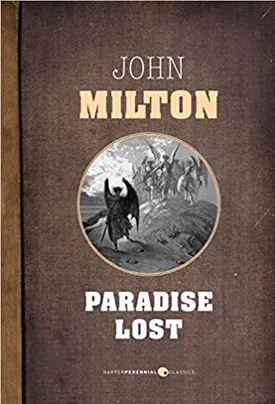Paradise Lost by John Milton is an epic poem first published in 1667. In it, Milton presents a history of the rise and fall of man, as well as a contemplation of his own spiritual journey. The epic poem traces the fall of Adam and Eve and the corruption of their paradise, and it reflects upon the human condition and its need for redemption.
Milton begins his poem by recounting the history of man’s creation. He tells of God’s creation of the cosmos, then of the seven days in which God creates the various elements of our world. He also recounts how God creates Adam and Eve as the original parents, as well as the Garden of Eden, which He grants them as a gift. Following this, Milton explains how God issued his warning to Adam and Eve, forbidding them from eating from the tree of knowledge.
Next, Milton transitions to the events following God's warning. He recounts how Satan, in the guise of a serpent, deceives the pair and causes them to take a bite from the forbidden tree. By doing so, Adam and Eve violate God’s command and are thusly condemned. God expels them from the Garden of Eden, and with it the paradise in which they were placed.
The remainder of the story follows the consequences of their fall. These include the introduction of death and Genesis as a whole, which as a result, brings pain and suffering. Milton also points to the importance of redemption, meandering through the character’s guilt and desire to find absolution. He also highlights moments of inspiration given by the Archangel Michael, who acts as a guide to Adam and Eve. Throughout the story, Milton grapples with the idea of free will, as the original parents are thrust into the world with a sense of uncertainty and guilt. Subsequently, however, Paradise Lost finds a resolution in the redemption provided by God.
Milton takes a deep look into the idea of temptation, in particular how it can lead to one’s downfall. His characters are shown to struggle with their impulses and in the end, succumb to them. Paradise Lost also encourages its readers to confront their own visions of divinely-prompted redemption, further reinforcing Milton’s belief in the importance of faith over human weakness.
Paradise Lost is a timeless classic that is still celebrated for its spiritual implications and its poetic grandeur. It will remain a powerful story for its statement on the human condition and its message of redemption. Many have found solace in Milton’s words over the centuries, and it remains a testament to his skill as a poet. In its sincere meditations on sin and its profound consideration of repentance, Milton’s characters offer an insight into the human experience. In Paradise Lost, Milton invites us to ponder his original question: even if one’s paradise is lost, can redemption be found?

